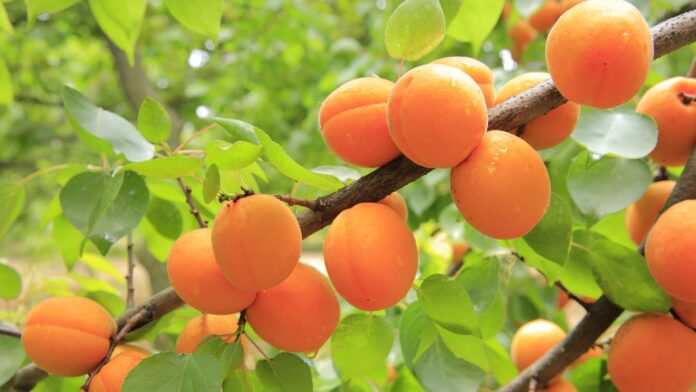The apricot (Prunus armeniaca) is a small, golden-orange stone fruit belonging to the Rosaceae family, which includes peaches, plums, and cherries. Thought to have originated in China over 4,000 years ago, apricots later spread through the Silk Road to regions like Armenia and Persia, eventually reaching the Mediterranean. Known for their sweet, slightly tart flavor, apricots are widely enjoyed fresh or dried and are celebrated for their nutritional benefits, containing high levels of fiber, beta-carotene, vitamins A and C, and potassium.
Interesting Facts About Apricots
- Apricots originated in China over 4,000 years ago and later spread to regions like Armenia, which is sometimes credited as a historical center of apricot cultivation.
- Apricots belong to the rose family, alongside peaches, cherries, and plums, and are classified as drupes due to their single central pit.
- Their English name has roots tracing back through Portuguese, Arabic, and Latin, reflecting their long journey across cultures.
- Apricots contain a high amount of beta-carotene, antioxidants, and fiber, making them nutritionally beneficial, especially for eye health and digestion.
- The tiny hairs on apricot skin help protect them from pests and fungal diseases, contributing to their unique velvety feel.
- Turkey leads the world in apricot production, and California is the primary source of apricots in the United States, contributing about 95% of the country’s output.
- Some varieties of apricots, like the “Black Apricot,” display unique dark purple hues, showing the diversity within the species.
- In traditional medicine, apricot seeds have been used for respiratory ailments, though they contain amygdalin, which can convert to cyanide when consumed in high quantities.
- Dried apricots offer a concentrated nutrient source and have an extended shelf life, though some vitamin C is lost during drying.
- Apricot trees are small but long-living, producing fruit for up to 25 years under ideal conditions.
- Asthma Risks: Dried apricots can contain high levels of sulfites, which may trigger breathing issues for people with asthma or sulfite allergies. Opting for sulfite-free dried apricots can be safer for sensitive individuals.
- Origin Mystery: Though often associated with Armenia (hence the name “armeniaca”), apricots are believed to have originated in Central Asia, with evidence of ancient cultivation in China over 4,000 years ago.
- Low Glycemic Index: Apricots are great for people monitoring blood sugar levels due to their low glycemic index, and they contain only about 3.2 grams of natural sugar per fruit.
- Hidden Cyanide: Apricot kernels contain amygdalin, which can release cyanide. Eating them in large amounts can be dangerous, so moderation is key.
- Versatile in Dried Form: Dried apricots are a nutrient-dense snack that adds flavor and nutrients to salads, trail mixes, or even savory dishes like pilafs.
- Ancient Superfood: Revered in Greek and Roman societies as symbols of fertility and prosperity, apricots have maintained their status as health-boosting fruits rich in vitamins A and C, fiber, and potassium.
- Long-Lived Trees with Limited Production: Apricot trees can live up to 150 years but only produce fruit for about 20–25 years, often taking extended breaks from fruit-bearing.
